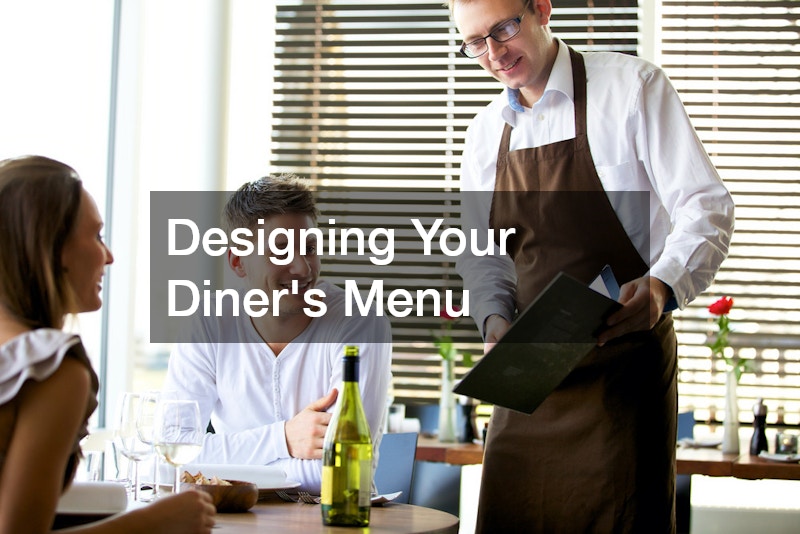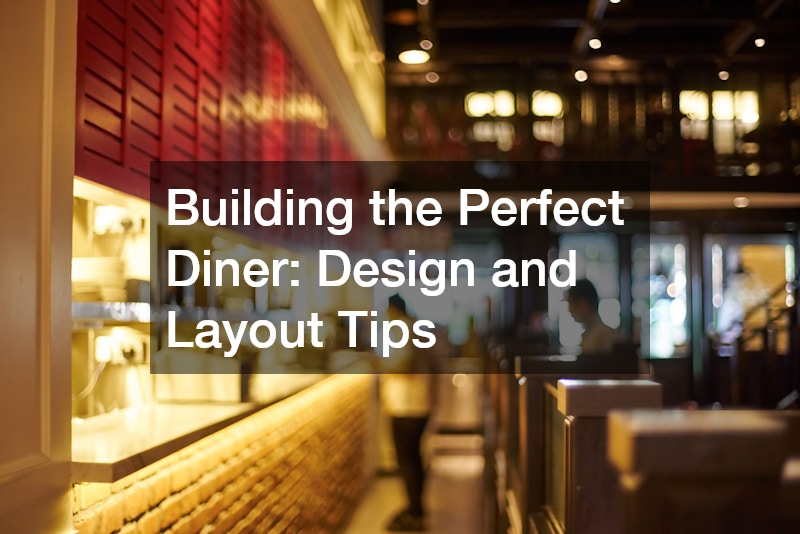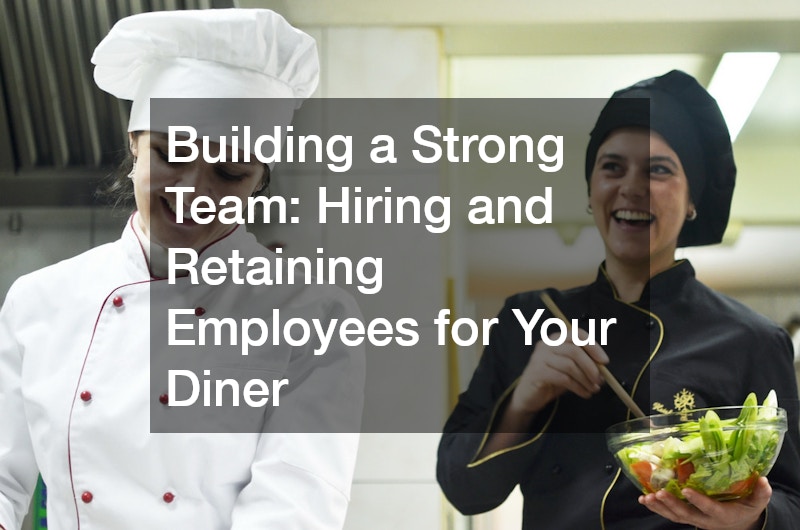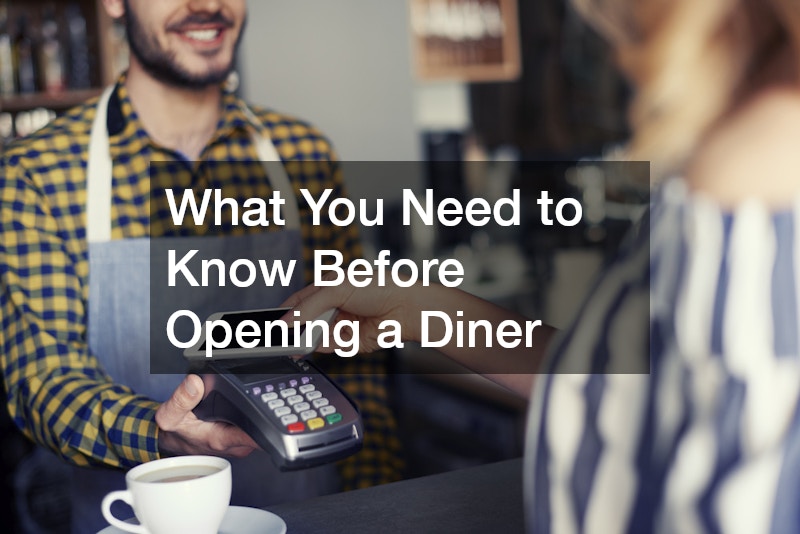Opening a diner can be an exciting and rewarding venture, but it’s not devoid of challenges. Diners hold a special place in culinary culture, known for their hearty meals, nostalgic ambiance, and community-centric atmosphere. As an entrepreneur, the journey requires diligence, creativity, and a thorough understanding of the industry.
In this comprehensive guide, we’ll walk you through crucial aspects you’ll need to consider when opening a diner. From menu planning and selecting vendors to designing the space and navigating legal requirements, we’ll explore tips that will help you when opening a diner. Given the dynamic nature of the food service industry, laying a solid foundation through prudent planning is indispensable.
Whether you’re dreaming of serving classic breakfast staples or local lunch favorites, you’ll need a diverse skill set to bring your vision to life. Have your sights set on creating that perfect neighborhood spot? Understanding all angles of diner ownership—from food logistics to customer retention strategies—is key. Let’s dive in and explore what it truly takes to open and operate your very own diner.

Designing Your Diner’s Menu
Crafting your diner’s menu is one of the foremost steps in the journey. The menu dictates the type of cuisine you’ll offer and plays a critical role in shaping customer experiences. It’s important to design a menu that showcases a variety of options to appeal to different tastes and dietary preferences, all while maintaining a consistent theme.
Food logistics is another pivotal area to focus on when opening a diner. Establishing reliable connections with local suppliers ensures you can source fresh ingredients daily. Consider forging relationships with farmers for organic produce and bakers for bread supplies, enhancing the authenticity and quality of each meal served.
Beyond food sourcing, consider how you will handle inventory management, storage, and delivery schedules. Employing efficient food logistics practices will minimize waste and help to maintain the crucial balance between cost and quality. It’s essential to stay ahead of potential disruptions by maintaining multiple supplier contacts and consistently monitoring market trends.
Creating the Perfect Diner Ambiance for a Memorable Experience
Creating an inviting ambiance can set a diner apart from the competition and attract a devoted clientele. The ambiance is not just about decor but also involves the diner’s overall atmosphere, including music, lighting, seating arrangements, and even staff attire. Dive deep into how you want your customers to feel when they walk through your doors.
In a family restaurant setting, comfort and warmth are key attributes. You might choose vintage elements like retro booths, chrome accents, and checkerboard floors to evoke nostalgia or go for a more contemporary vibe featuring sleek designs and vibrant colors. Your ambiance should reflect both your brand identity and the community’s taste.
Customer experience should be at the forefront of ambiance planning. Engaging designs and themes can enhance meal enjoyment and entice customers to return. Beyond the aesthetics, consider aspects like acoustics and table configurations to ensure privacy without sacrificing the lively diner spirit. Good ambiance transforms a meal into a memorable outing.
Navigating Legal Requirements: Licensing and Permits for Your Diner
Navigating the legal landscape is fundamental when opening a diner. You’ll need different licenses and permits to ensure that your restaurant complies with health and safety regulations. These can vary by location and involve zoning, food safety, and health department certifications.
Engaging a business lawyer can streamline this legal process, as they specialize in understanding the intricacies of local laws. A business lawyer can help you draft contracts, negotiate leases, and ensure you’re operating within the legal frameworks of the restaurant industry.
Having all necessary paperwork settled before opening a diner can prevent costly legal complications down the line. It’s wise to conduct thorough research and maintain open communication with local authorities and your business lawyer to stay abreast of any changes in legal requirements. Compliance is not just about legality but also about safeguarding customer trust and safety.

Building the Perfect Diner: Design and Layout Tips
The design of your diner’s building is a crucial aspect that affects both functionality and appeal. Partnering with a commercial building contractor who specializes in restaurant construction can make this process more manageable. Their expertise can guide the structural layout to optimize kitchen flow, dining space, and access points.
Factors such as electrical systems, plumbing, ventilation, and fire safety must be integrated into the design phase. Collaborating closely with your contractor can help you conceptualize an efficient kitchen that minimizes congestion and maximizes productivity. The aim is to create a layout that meets operational demands without compromising on style.
Additionally, exterior features like signage, outdoor seating, and landscaping should mirror the interior ambiance. Your building contractor will help ensure these elements cohesively incorporate both aesthetic charm and functional utility. Thoughtful design planning is essential for creating a practical and inviting diner environment.
Planning a Convenient and Accessible Parking Lot for Your Diner
A convenient and accessible parking lot is vital to attract and retain diner patrons, with the parking availability often influencing their decision to visit. Partnering with a paving contractor ensures your parking area is well-constructed, adhering to local codes and standards.
Discuss with your paving contractor the optimal layout that can accommodate the expected volume of guests and provide smooth traffic flow. Incorporate features like clear signage, adequate lighting, and pedestrian-friendly paths to enhance customer convenience and safety.
Accessibility for all patrons, including those with disabilities, should be a priority in your parking lot design. Consider spaces for bikes and electric vehicle charging stations, catering to eco-conscious customers. A well-planned parking area complements the overall efficiency and appeal of your diner.
Effective Strategies for Attracting and Retaining Diner Customers
In today’s competitive dining market, innovative sales strategies are key to attracting and retaining customers. The first aspect of any marketing plan should focus on understanding your target demographic and tailoring your offerings to meet their needs and preferences. Whether it’s a particular cuisine, dietary option, or atmosphere, identifying what resonates with your customers can set you apart from the competition.
Positioning your diner as a community hub can create a loyal customer base. Organize events like theme nights, cooking classes, or live music to engage the local community. These events not only attract customers but also encourage repeat visits, as patrons will associate your diner with fun and memorable experiences. Leveraging social media platforms to showcase your menu, share customer testimonials, and offer promotions can also help broaden your reach. Engaging with your audience through platforms like Instagram and Facebook allows you to keep your brand top of mind and create an interactive connection with your customers.
Providing exceptional customer service reinforces the personal connection diners have with your establishment. Offering loyalty programs or discounts for frequent visitors can further cement these relationships. Whether it’s a personalized greeting, a quick response to concerns, or a small freebie, excellent customer service creates a positive dining experience. Customer engagement and satisfaction are integral components of maintaining a flourishing diner business, helping you to build a strong reputation and ensure long-term success.

Maintaining a Safe Environment for Customers and Staff
Ensuring the safety of both your customers and staff is paramount for successful diner operations. Implementing robust safety measures reduces the risk of accidents and enhances trust in your establishment. Fire sprinkler design should be a priority in your safety plan, safeguarding your premises against potential fire hazards. A properly installed and maintained sprinkler system can be a lifesaver, helping to minimize fire damage and providing enough time for evacuation.
Compliance with health standards is another vital safety consideration. Regular inspections and adherence to sanitation protocols ensure a clean dining environment. This includes proper food handling, cleanliness of kitchen equipment, and maintaining restrooms to a high standard. Health violations can result in penalties or closures, so staying on top of these requirements is essential. Train your staff in emergency procedures and health practices to bolster overall safety preparedness. Having a knowledgeable team ready to handle medical emergencies, fires, or natural disasters can save lives and prevent costly damages.
Safety is not a one-time setup but a continuous commitment. Regular evaluations and updates to your safety systems are necessary to adapt to evolving standards and address new challenges. Keeping your safety measures current ensures your diner is protected against unforeseen risks. When opening a diner, maintaining a safe environment is crucial for customer confidence and operational longevity, making it an investment that pays off in the long run.
Building Relationships with Local Contractors for Diner Success
Establishing relationships with local contractors is beneficial for ongoing maintenance and operations. Local appliance repairs can be invaluable for addressing equipment breakdowns quickly, minimizing downtime, and maintaining service standards. When your equipment fails, time is of the essence, and having a trusted local technician can get your kitchen back up and running without unnecessary delays.
Build a network of trusted contractors who can handle various needs, from electrical issues to plumbing repairs. Developing these relationships in advance ensures that you are prepared for any emergencies, and contractors will become familiar with your business and its specific needs. Regular maintenance of kitchen appliances and facility infrastructure is necessary to ensure efficient operations and prolong equipment lifespan. Preventative care can reduce the risk of major repairs and save you money in the long term.
Being aware of local contractors also aids in negotiating favorable service terms and encouraging prompt response times. Establishing a reputation as a reliable customer can help you secure better rates and quicker service. By integrating local expertise into your business, you’re not only supporting the local industry but also ensuring your diner’s needs are met reliably and efficiently. This local network provides a valuable resource, making it easier to handle repairs and maintenance while strengthening your ties within the community.
Financial Planning for Your Diner: Initial Payments and Budgeting Tips
Financial planning is one of the critical components that can determine your diner’s success. Consulting with a financial planner can help you establish clear budgetary frameworks and financial goals. They can guide you in securing funding, managing cash flow, and planning for unforeseen expenses.
Initial payments will likely cover securing property, renovation costs, and procuring necessary equipment. Allocate funds for licensing fees, advertising, and initial staff wages to streamline opening operations. A well-structured financial plan provides a roadmap for managing resources effectively. It is also essential to account for regular operational costs, such as inventory, utilities, and maintenance, which can fluctuate seasonally.
Additionally, a contingency fund should be established to cover unexpected expenses, such as repairs or market changes. This buffer can offer stability in challenging times and prevent unnecessary disruptions to business operations. Financial planning also includes setting short- and long-term goals that align with your vision for growth, whether it’s expanding your menu, increasing seating capacity, or opening additional locations.
Investing in professional financial guidance can equip you with strategies to maximize profitability and sustain growth. Regularly reviewing financial performance in collaboration with your planner helps you pinpoint opportunities for improvement and secure your diner’s financial health. Establishing financial discipline from the start ensures that your diner remains competitive, sustainable, and ready for the challenges of the industry.

Building a Strong Team: Hiring and Retaining Employees for Your Diner
Employees are the backbone of any successful diner, underscoring the importance of careful hiring and retention strategies. When recruiting, look for individuals who not only possess the necessary skills but also align with your diner’s culture and values. Conduct thorough interviews to assess both competence and cultural fit.
Partner with employee benefits providers to create comprehensive benefits packages. Offering competitive salaries, health insurance, and retirement plans can attract top talent and reduce turnover rates, contributing to a stable and motivated team.
Ongoing training and development opportunities can further enhance employee satisfaction and performance. By fostering a supportive and engaging workplace when opening a diner, you empower your staff to deliver exceptional service and elevate your diner’s reputation. Remember, a happy team leads to happy customers.
Opening a diner involves multiple facets, from menu design to employee management, each requiring careful consideration and planning. By paying attention to detail across all aspects—food logistics, ambiance, legalities, design, and finances—you are positioning your diner for success in a challenging yet rewarding industry.
The persistent theme of community is significant; diners thrive as social landmarks in neighborhoods. The strategies discussed whether they pertain to logistical arrangements or customer retention, all aim to forge and maintain a welcoming environment for customers and staff alike. Thoughtful planning is imperative to transform your vision into a cherished venue.
As you move forward, remember that flexibility and resilience are just as important as strategic planning. Keeping abreast of industry changes and adapting accordingly will help when opening a diner by allowing it to evolve and flourish. By combining passion with practicality, you can achieve a thriving, beloved restaurant.






